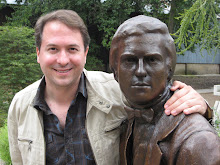Day Three
Wednesday afternoon, July 8th
After seeing the first half of Darwin on Stage and in Poetry, I headed over to the Universal Darwinism for part two of the session, which was mostly about memetics. It was sort of a pro and con view.
First up was Professor of Philosophy of Science Kim Sterelny, who holds professorships in both Australia and New Zealand speaking on 'Information Sharing and the Challenge of Novelty'. Sterelny's lecture was not only interesting and far-ranging, but also quite entertaining in his use of colourful language ("[attempts to model cognitive psychology] turn out to be f-ing hard!" "We can handle new risks and problems...like that sh*thole LAX!"). Regardless he had a lot of interesting things to say about how the human mind developed and the evolution of culture. He believes that the human "Information market" has a high profit/cost ratio, there was often a low risk of deception or defection in directly teaching new technologies and that an important element is social learning by doing, for example the apprentice to an early human stone shaper. I got the impression that his mind works much faster than his mouth can keep up, which lead to far too many "you know"s cropping up in his speech.
Next up was Professor and Director of the International Cognition and Culture Institute Dan Sperber from the Institut Jean Nicod in Paris. His talk was called Evolutionary approaches to culture: Three challenges and solutions, and put forth the overall position of Yes to Darwinism, but No to memetics. Much of his talk was developing his idea of Cognative Casual Chains, for example a meaning in someones mind leading to an utterance, leading to an interpretation in someone else's mind. I found his definition of imitation a little odd, Sperber believes that a person can imitate the sound of a word, but can not imitate the meaning, since it is not visible. Thus leading to his conclusion that the fidelity of cultural ideas is too low for culture to be Darwinian. He didn't seem to be a strong opponent to the usefulness of memes, but was just looking at the same questions from a different perspective. Dan Dennett (who obviously is a huge proponent of memetics) said afterwards that Sperber's position did not differ strongly from his own. As in many differences in philosophy, it seems to come down to slight differences in definition or meaning.
Next up: Day four brings The Shadow of Darwin in Humanity Today, a session of mostly evolutionary anthropology featuring Richard Wrangham and Chris Stringer among others.
Thursday, July 23, 2009
Subscribe to:
Post Comments (Atom)




Hi,
ReplyDeleteI have a Google Alert on 'Universal Darwinism' that pointed me to this most interesting Blog.
I maintain a site www.universaldarwinism.com that may be of interest. It features a number of researchers working on scientific theories utilizing Darwinian processes.
Cheers
John